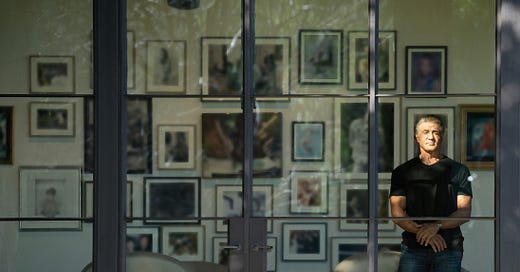PFF32: 'Sly' tells us little about Sylvester Stallone that we didn't already know
The career-spanning documentary, while a must for fans of the actor, doesn't go into all that much depth about Stallone's life and career.
Arnold Schwarzenegger and Sylvester Stallone were the two leading action stars of the 1980s, who found themselves friends, rivals, friendly rivals, and even co-stars at various times. Then, this year, both were the subjects of career-spanning documentaries, both for Netflix, with each man appearing in the other’s doc.
If Arnold, the Schwarzenegger documentary, was too long in three parts and at over three hours, then Sly, the new exploration of Stallone’s life and career, is too short, at just over 90 minutes.
The film, which served as the final screening of the 32nd Philadelphia Film Festival on Sunday and lands on Netflix this Friday, features Stallone discussing his entire life and career up until this point. While fans of the Rocky and Rambo series, as well as his other work, will find a lot to enjoy here, there’s a ton missing as well.
Sly was directed by Thom Zimny, who has helmed several projects with Bruce Springsteen, including the outstanding 2020 album-making-of documentary Bruce Springsteen’s Letter to You.
Here, he uses a couple of unique, mostly successful filmmaking conceits: Stallone is moving out of his mansion in Los Angeles, decorated with a massive amount of personalized movie memorabilia, including what appear to be four or five different Rocky statues. As the stuff gets carted out, he expounds on what they meant to him while telling stories about this career. Additionally, Stallone plays a tape of an old New York Times interview, comments on it, and occasionally argues with it.
If you know Stallone’s story well, there’s not a lot here that’s going to surprise you. He grew up in relative squalor in New York, with a father who by today’s standards would be considered abusive. He toiled around New York for a while in bit theater parts, then headed to L.A., where he got his first big part in Lords of Flatbush, before writing and starring in Rocky, the movie that would make his career. And the Rocky stories he tells will be so familiar to most people watching this film that they could likely recite them along with him.
There’s some fascinating stuff in his storytelling, especially when he admits fame got to his head at a point, while he spent much of the ‘90s making flops- leading up to 1997’s Cop Land, which had every hallmark of a comeback vehicle but just didn’t succeed. He also admits regret about not being there enough for his son Sage, who co-starred with him in Rocky V and died back in 2012.
The actor later defends his nearly endless series of sequels to the Rambo and Rocky movies, while also likening his Expendables series to long-ago rock bands who continue to perform into old age.
Stallone does much of the talking, although we also hear from such talking heads as his brother Frank, Quentin Tarantino (wearing his ‘70s cinema fanboy hat), and Schwarzenegger, who tells the familiar but wonderful story about how he tricked Stallone into agreeing to star in the misbegotten comedy Stop, Or My Mom Will Shoot.
All that is fine, but due in part to the short running time, it’s almost shocking how much is left out. The Party at Kitty and Stud's, the softcore film the actor appeared in in 1970, is not mentioned, while the actor also neglects to talk about Demolition Man, which interrupted his string of flops in the 1990s and is a much-liked film to this day. It also skips right past Creed, a modern classic reboot of the Rocky franchise that earned Stallone his first Oscar nomination in nearly 40 years, back in 2015.
None of the three Mrs. Stallones are ever mentioned by name, nor is any other past or present romantic partner, nor is it clear the exact circumstances of why Sly is moving out of his home, or where he’s going (the actor briefly split with wife Jennifer Flavin, but they have since reconciled.)
Stallone, who normally never turns down a media appearance in the Philadelphia area, would likely have appeared at PFF, if not for the continuing SAG strike. His film is good for what it is, but it could have been longer and could have been more.






